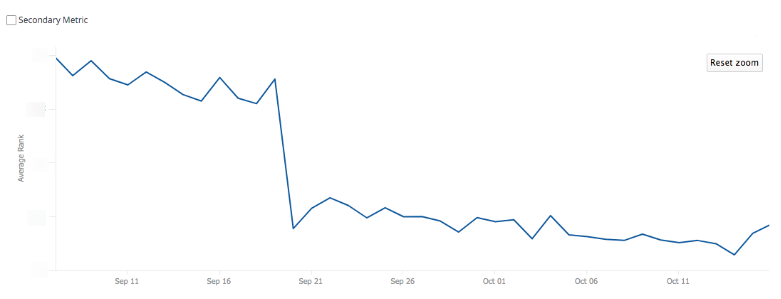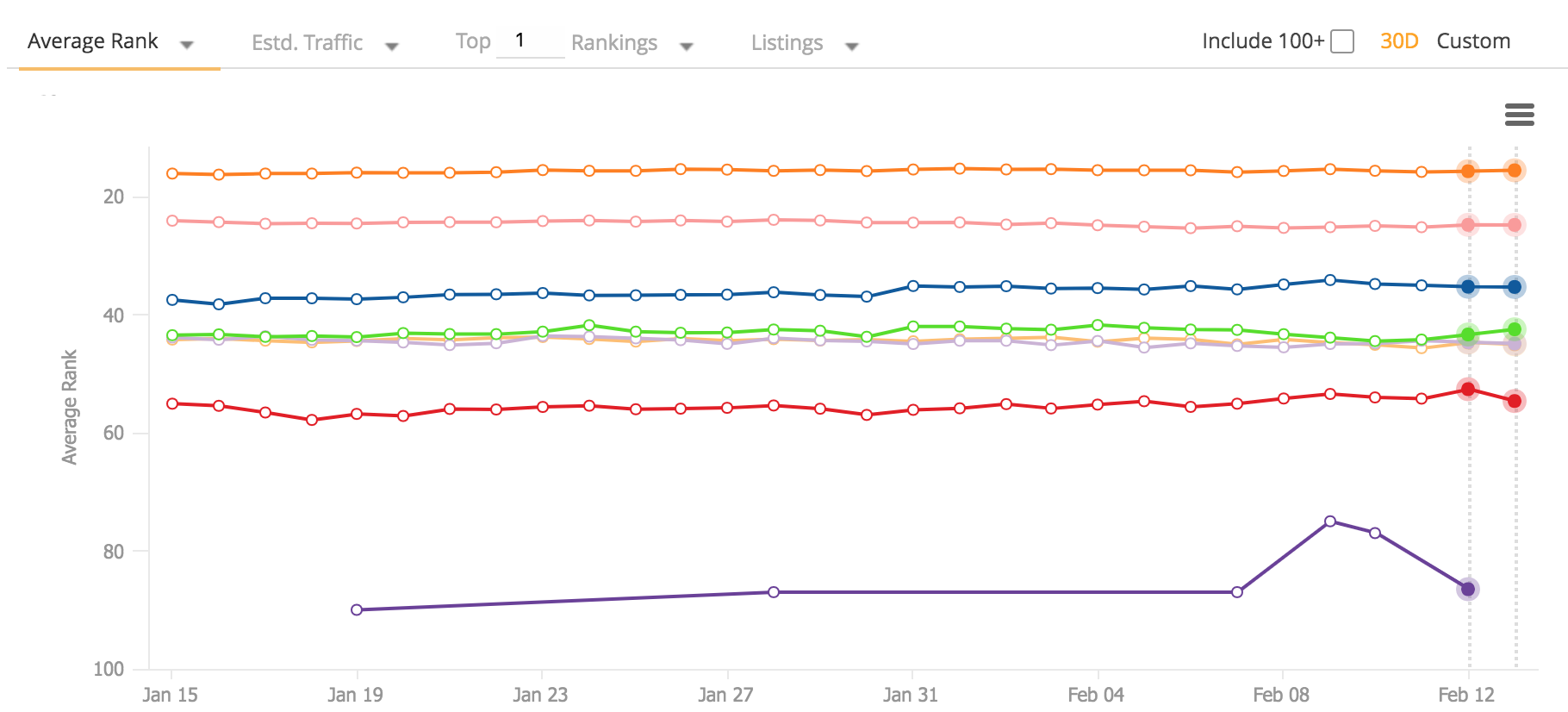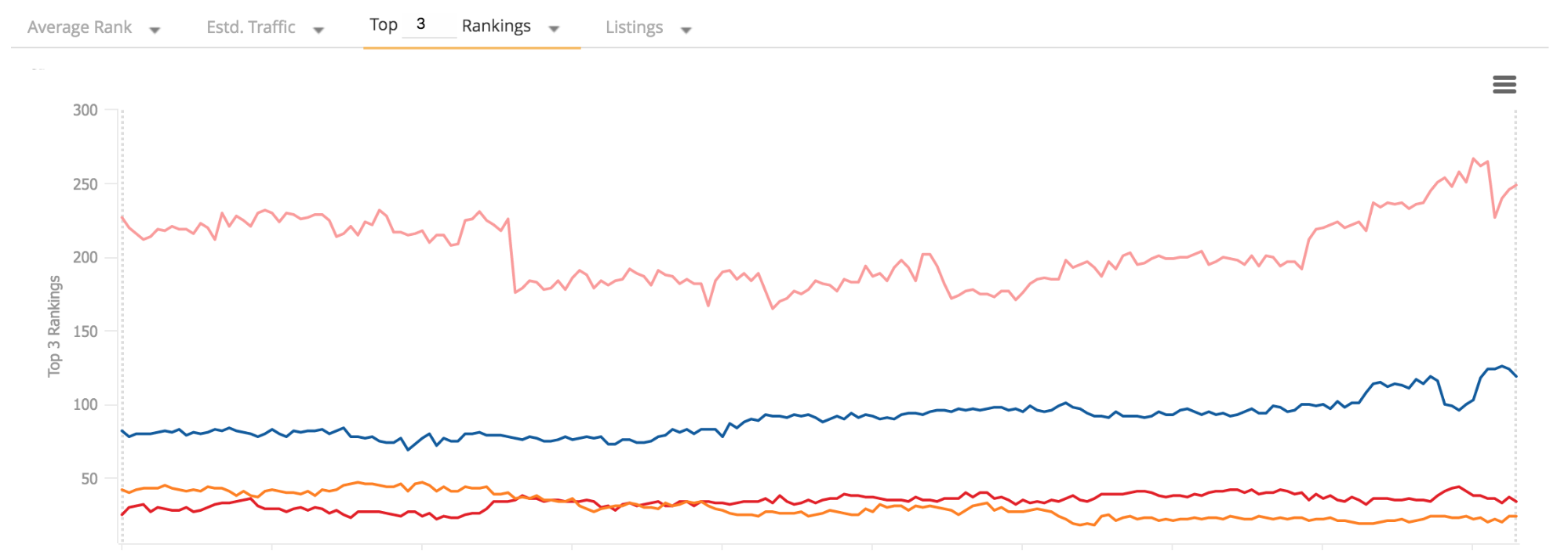There’s an ongoing debate among SEOs as to whether you should still be tracking keyword rankings. Personally, I think you absolutely should, so for this post, I’ve decided to share my thoughts and give an overview on the issue.
I want to prove to you why monitoring rankings is still relevant and important to SEO success. You'll learn how understanding the rank position of specific keywords can guide your SEO efforts.
Now, before we move on, I admit that there are indeed many challenges with tracking rankings properly.
Localized SERPs, SERP features, and many more factors change rankings for users on an individual basis. In spite of this, however, ranking data still delivers an incredible wealth of SEO insights that you cannot get anywhere else.
In fact, if you were to no longer track keyword rankings, it would be extremely difficult to get a lot of the value and insights that you require as an SEO.
So, below are seven reasons why you should track ranking data.
After reading the list, I’m sure you’ll agree that the monitoring of keyword rankings with SEO tools (i.e. rank trackers) – or ideally, part of an enterprise SEO platform – is still an integral task for successful search engine optimization.
Recommended Reading: How to Monitor Keyword Rankings
Reason #1. Troubleshoot Traffic Drops
Traffic drops happen. Sometimes, they are caused by a Google algorithm update – the search engine is known to launch both confirmed and unconfirmed updates regularly, after all. Many of those updates can affect your organic traffic.
But drops or ranking fluctuations may have other causes too. It could be that the search engine is testing new SERP features, a technical glitch on the site that is throwing keyword positions off, a penalty or manual action by the Google spam team, or something else entirely.
Reviewing keyword rankings is the best place to start when you’re trying to troubleshoot such a drop. But to check keyword rankings, you’ll need to have been tracking them to get a clear view into the trend and your associated ranking position.
When you have your rankings in a connected SEO platform you can more quickly see how rankings influence your other metrics.
Rankings allow you to notice which pages (or keywords) have dropped, when, and even come up with hypotheses as to why the drop may have happened in the first place.
For example, if your top performing page went from the first page of the SERP to the second, you can immediately prioritize that page to fix the issue. There’s no reason to lose valuable traffic when you can review, analyze, and solve the problem.

(seoClarity’s Rank Intelligence report showing a sudden traffic drop.)
Reason #2. Identify New Opportunities
Search results have changed so much over the last few years that the SERP look nothing like the ten-blue links we had come to know and love.
But as much as those changes provide users with a fantastic search experience, they are hard to keep track of for an SEO. Well, that is, at least not without rank tracking data that reveals how a domain performs in the featured snippet and other SERP features.
This is particularly important when you want to learn from your and your competitors’ performance at scale, monitoring thousands of keywords and pages (or more).
Similarly, tracking rankings in the SERP features can highlight the potentially missed opportunity behind zero-click searches. As research proves, more than half of Google searches do not result in a click anymore.
But it’s not all that bad, actually. The changes to SERPs present new opportunities to drive anything from brand awareness to traffic to conversions. For example, you can analyze the SERP to see if there is potential to win the Answer Box.
However, to avail of those opportunities fully, you need to have the right data about the SERP – data that only a proper rank tracker can provide.
Reason #3. Monitor Your Competitors
Keyword rankings deliver more than data on your domain’s performance. You also learn how well (or not) your competitors are ranking for your target phrases. What’s more, the data can also reveal what they’re doing to steal the traffic from you.
Monitoring competitors’ rankings can tell you whether they’ve launched new landing pages or content in general to rank higher for specific phrases. It can also tell you whether those companies have suddenly started to target new phrases with new pages and so on.
Based on such insights, you can choose to improve your content to solidify your rankings or launch new pages to outrank the competitors for the keywords they began to go after.
The thing is, you can only do this if you know how your competitors’ domains perform in search, and that's an insight that only keyword rankings can reveal.

(High-level competitor rankings report in seoClarity)
Reason #4. Identify Organic CTR Issues
Ranking in SERPs only gets your content in front of the target audience. Naturally, without it, you wouldn’t get any traffic. But even the highest rankings cannot guarantee a stream of website visitors.
For that to happen, those people must click on your search listing.
But how can you tell whether or not they do, or if your pages achieve a healthy organic click-through rate? Indeed, you must monitor rankings and correlate the data with the average organic CTR pages on those spots could expect from Google.
Similarly, spotting organic CTR anomalies can suggest quick wins like amendments to the metadata to achieve the expected market share.
Reason #5. Identify Keyword Relevancy
In the past, we’d position a page for a single keyword and certainly no more than three. Today, a page typically ranks for multiple phrases and their variations.
Take a look at this data, for example. The page I reviewed ranks for 792 keywords in total, and promises a total search volume of 1.4M.

However, I can see that some of those keywords (note: the keyword list and its respective URL are out of view) aren’t fully relevant to the page’s topic. Sure, they still match the overall site’s topic, just not the page itself.
This also explains the page’s poorer rankings for those phrases.
Luckily, such data holds an incredible opportunity. The site’s marketing team could easily create new pieces of content or improve existing pages to target those phrases and their intent and achieve higher rankings for those, driving even more relevant traffic to the site.
Why is this so important?
Well, for one, it helps to understand the experience of potential customers.
Knowing which keywords aren’t fully relevant and addressing the issue also helps a brand to remain visible along the entire buying journey.
Finally, it can also reveal instances where the wrong page ranks for a keyword, and address the issue to improve rankings and traffic.
Reason #6. Rankings Present You with a Data You Can Report On
Reporting on SEO and proving the campaign’s success remains one of the key challenges for SEOs. After all, how do you demonstrate the impact of your work on the company’s bottom line?
Well, one way is to show how many keywords have started to rank since your last report, at which positions, and how much traffic and sales those ranking keywords impacted the associated pages.
Similarly, you can report on the performance change over time to illustrate your overall progress. You can report on the number of keywords that have moved up from positions 3-5, for example, or how many jumped to page one from page two, and so on.
But again, to deliver SEO reports like that, you need keyword ranking data.
Recommended Reading: SEO Ranking Reports: Accounting For Search Visibility Changes

(Rank Intelligence dashboard widget for reporting in seoClarity which shows the amount of top 3 ranking keywords.)
Reason #7. Identify Low-Hanging Fruit Opportunities
Given how long many SEO strategies take to bear fruit, I’m not surprised by how many SEOs focus on quick wins. Working on those opportunities can help maximize the investment and deliver results faster.
Keyword ranking data can help identify many such opportunities.
For example, it can reveal keywords and phrases whose rankings you could improve quickly and double or triple their traffic.
For example, reviewing the ranking report for high search volume phrases on positions 4-7 can reveal many opportunities.
Why, because you can move those keywords to higher rankings and immediately increase their impact on the company’s traffic by optimizing the meta data, content, links to the page, or resolving a UX issue.
But like I said many times in this article, doing so is only possible if you have a consistent and reliable keyword ranking data.
How seoClarity Makes Rank Tracking a Breeze
seoClarity delivers daily rankings to reveal a domain’s full SERP visibility. With no artificial limitations to what you can track, you can monitor SEO to see how your content performs globally and locally – even at a granular level.
What’s more, as the SERP is constantly evolving and the search engine is adding new schema, you are also able to monitor visual rankings on the SERP based on pixel depth. All of the above reasons to monitor your keyword rankings are a possibility with Rank Intelligence.
And many more keyword tracking tools exist on the market, too. In fact, we’ve put together a list of the best keyword rank tracking tools to get the job done properly — some of which include a free trial. (But don't forget about Google-owned tools like Google Search Console and GA. They are both free SEO tools that can help inform your strategy.)







2 Comments
Click here to read/write comments